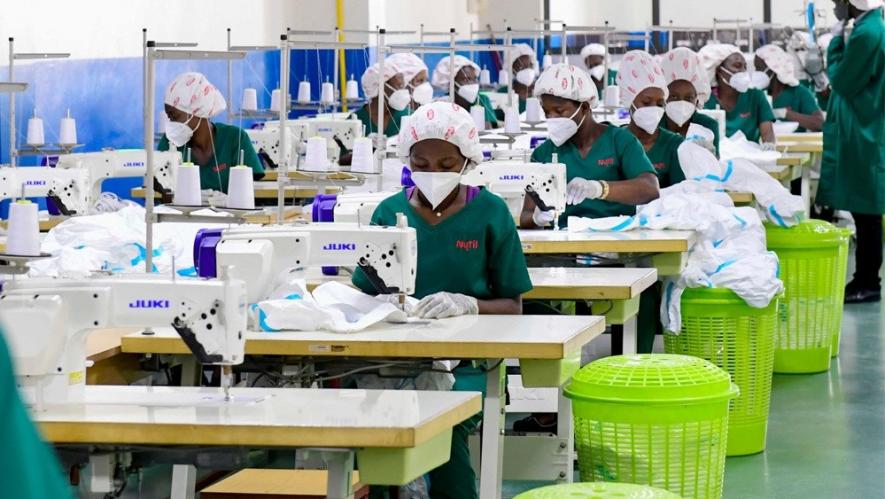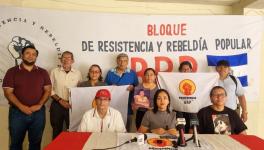Amid Threats And Exploitation, Ugandan Union Strives to Organise Garment Sector

Uganda textile workers at Nytil a local factory that produces textiles for the local market and for export. Photo: Waligorahim via Wikimedia Commons
Earlier in May, five members of the Uganda Textiles, Garments, Leather, and Allied Workers Union (UTGLAWU) were arrested by police in the capital of Kampala.
Carrying posters and a banner that read “Pay your workers, respect labor rights,” the group had arrived at a store that sold products by apparel multinational corporation, Adidas, to deliver a letter as part of an ongoing global campaign against wage theft and exploitation of workers in the garment supply chain, particularly during the COVID-19 pandemic.
The campaign, which is composed of 285 trade unions and labor rights groups, has accused Adidas of withholding pay from workers, with US$11.7 million in wages owed to workers in eight supplier factories in Cambodia alone.
The UTGLAWU’s solidarity action started with union members approaching the store in Kampala to deliver a letter. However, they were arrested and taken to the central police station. They proceeded to be detained and interrogated for hours as police attempted to frame their action as an unlawful protest and trespass, constituting a violation of the Public Order Management Act (POMA).
The retaliation to this simple act of solidarity with garment workers in another part of the world signals to the environment of intimidation that union leaders and activists have been subjected to in Uganda, especially in a sector that is generally notorious for job precarity and exploitation undergirded by policies that have prioritized investment over decent working conditions
Peoples Dispatch spoke to Irene from UTGLAWU about organizing workers in the country’s garment and textile industries, and the impact that neoliberal structural adjustment has had on labor rights in Uganda.
While the union was formally registered in 1979, its struggles trace back to the 1950s, when the former colonial government set up the Nyanza Textile Industries along the Nile. Irene went on to explain that workers at the facility had tried to form an association to collectively bargain on their own. However, although that was not successful, the association itself would progress over the years and ultimately become the UTGLAWU.
While the union currently has approximately 7,000 members, having mobilized workers in textile and garment factories, it has also been working to broaden its sphere to include workers in the informal economy, including people working in Small and Medium Enterprises (SMEs).
Impact of Structural Adjustment Programs
Much like in other parts of the Global South, Structural Adjustment Programs (SAPs) and attendant liberalization and privatization had a severe impact on Ugandan workers, with mass job losses, informalization, and factories being sold off, all of which also had a decisive impact on the strength of unions. The COVID-19 pandemic was another blow.
According to the Uganda Bureau of Statistics, as of 2021, the informal sector’s contribution to the country’s GDP stood at 51%. An estimated 79% of firms in Uganda are in the informal sector, with 75% of the country’s population operating in this sector according to the 2021 Poverty Status Report published by the finance ministry.
The informal sector is also known to have high rates of poverty existing concurrently with lower rates of welfare, and high degrees of overall precarity. With the onset of the COVID-19 pandemic, workers in sectors, including garment and textile industries, began to be laid off without notice, and sent home without any severance pay, Irene said.
Meanwhile, she added that the UTGLAWU was also trying to reach out to home-based workers, including those involved in tailoring, sewing, and knitting activities. According to a 2013 World Bank report, 86% of jobs in the non-agricultural informal sector were household-based. The Union has also been mobilizing workers in the leather, plastics, and foam industries.
The union has also been gearing up to unionize workers in the cotton ginneries, where existing cooperatives collapsed with the advent of SAPs.
In a context where work in a factory is considered the “best job” one can get, in a country where 18 million people (or nearly 40% of the population) are struggling with multidimensional poverty, the factory floor has been a site of immense exploitation.
Irene detailed accounts of workers facing gendered sexual and physical abuse, delays in wage payments, a lack of medical insurance, a lack of compensation in cases of accidents, and exhausting working hours, with workers unable to take a break to even use the toilet. While freedom of association laws exist on paper, workers reportedly often faced victimization for joining a union.
Poor working conditons
Working conditions are also often unsafe, “with some workers given a single glove which they must use for a whole year,” while others are often forced to purchase safety equipment themselves.
While only about 18% of the working population is covered under the National Social Security Fund (NSSF), the UTGLAWU has encountered situations where social security contributions were being “channeled differently” by employers – instead of remitting the amount, employers “set it aside as a special fund to bail themselves out in case the factory goes down.”
Meanwhile, according to the union, workers are earning less than a dollar a day. Following decades of inaction on implementing an effective minimum wage, Uganda’s parliament passed the Minimum Wage Bill in 2019, based on a directive from the International Labor Organization (ILO). However, President Yoweri Museveni ultimately refused to sign the legislation into force.
Irene said further, “Workers are unable to afford the basics of life. For instance, most workers are staying in indecent housing, mostly in slum areas far away and they have to travel long distances just to reach the workplace. And with these hard economic times, workers cannot afford a decent meal a day, or even healthcare.”
The union has also noted that most facilities do not provide identification for workers, who are largely contractual and employed only for a certain period of time before being laid off.
Challenges to unionization
To even be able to learn of these violations has been a difficult task, given that some factories are heavily guarded and lack of access to workers remains a key obstacle to union organizing.
“The workers themselves fear that there will be retaliation…Most times when the union has recruited workers and a submission to the workplace [management] has been made, it has resulted in workers being fired.”
“Some garment production lines have been kept secluded for us, so even if we have been able to unionize other production lines, the garment sector has been a challenge,” Irene said. Industries operating in the sector include those producing finished products for exports to the US and Europe but also companies exporting to other countries in Africa, including the DRC and South Sudan, while some are purely focused on producing cotton lint.
While the textile industry in Uganda has been restricted to a few basic items of clothing, the country has become a market for secondhand clothing coming in from the west, which is also often cheaper and considered more “trendy” or “stylish” — “this is also choking the industry in the country”.
Imbalances in imports and exports, or broadly in trade, are also visible, for instance, in Uganda’s agreement with the US under the African Growth and Opportunity Act (AGOA). While the promise was that the projects under the agreement would provide employment opportunities while exporting finished products to the US under favorable conditions, some of the major products exported from Uganda to the US remain coffee, tea, and spices.
Not only that, working conditions were highly exploitative, as became apparent in the case of the “AGOA girls”.
In a country where youth unemployment has remained a persistent issue, these conditions have led to many leaving the country to seek employment abroad, while others have gravitated towards SMEs, including electrical shops, grocery shops, and salons.
However, “at the end of the day, these SMEs also face challenges because of exorbitant taxes and rents. Small businesses are closing down, and these are businesses of young people and women, including single mothers, who are then forced to go back home because they cannot afford to pay rent,” Irene said.
“Inflation is affecting many livelihoods, especially of workers who do not even receive their already little salary on time. During the COVID-19 lockdown, high oil prices led the cost of transportation to nearly double. It became a major challenge for most workers to commute from one point to the next. It still remains difficult for workers to afford these costs.”
“Creating jobs without really looking at the conditions of the jobs that are in place .. it is a violation of human rights. It is high time that the government wakes up to the issue of labor, and stops applauding investors for creating indecent jobs,” Irene added.
Get the latest reports & analysis with people's perspective on Protests, movements & deep analytical videos, discussions of the current affairs in your Telegram app. Subscribe to NewsClick's Telegram channel & get Real-Time updates on stories, as they get published on our website.
























